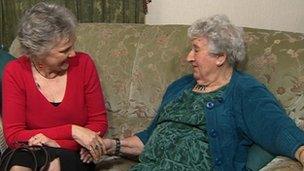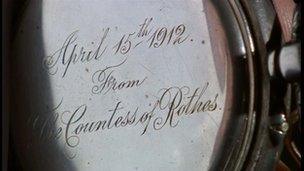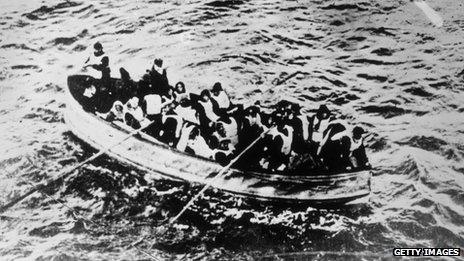Titanic: Unlikely friendship in lifeboat eight
- Published
He was a crewman from Wales, she was a countess from London travelling first class on the biggest passenger liner of the time.
If not for one of the biggest maritime disasters in history, it is unlikely their paths would ever have crossed.
But aboard Titanic's lifeboat number eight Able Seaman Thomas Jones and Lucy Noël Martha, Countess of Rothes, struck up an unlikely friendship that would last for the rest of their lives.
And now 100 years later their descendants have met for the first time.
Thomas William Jones was 32 years old when he boarded the Titanic as a member of the deck crew at Southampton.
The Countess of Rothes, who was "of independent means", was just a year older than the crewman when she boarded at the same port with her Scottish husband's cousin and her maid.

Ms Young promised Ms Jones she will keep the collection together
Five days after he left England, Mr Jones, who was known as Tommy, was put in charge of a lifeboat which contained 35 women, including the countess and her travelling companions, and three stewards, after the ship struck an iceberg.
He put the countess in charge of steering the boat because her husband had a yacht and she knew how to take a tiller and row.
Mr Jones, along with the countess and two others, wanted to go back to the scene of the sinking to rescue those who had ended up in the water but they were overruled by others on the boat.
In a letter published in a number of newspapers at the time the countess's husband's cousin, Gladys Cherry, praised the crewman and exonerated him from any blame.
The letter states: "I shall always remember your words: 'Ladies, if any of us are saved, remember, I wanted to go back. I would rather drown with them than leave them.'"
The passengers aboard the lifeboat then faced eight hours on the waters of the freezing Atlantic before they were picked up by rescue ship the Carpathia.
The rescued passengers and crew were taken to New York where Tommy Jones and the countess went their separate ways, never to meet again.
As a parting gift the countess presented the crewman with a silver pocket watch as a thank you for saving her life and he gave her a plaque displaying the number eight taken from the lifeboat they had met in.
They maintained correspondence for the rest of their lives.
Mr Jones later moved to Liverpool, where his daughter Nell still lives.
She said: "He was a lovely dad. I'm very proud of him.
"It must have been awful for them - you don't see these things and forget them."
Pound at Christmas
She added: "The countess used to send us a letter at Christmas and she always put a pound in."
She said her father had treasured his watch but 15 years ago she sold it at auction to raise some money.
The family had no idea where it ended up and Ms Jones was resigned to the fact she would never see it again.

The countess presented Tommy Jones with a watch as a thank you for saving her life
But the countess's own family had kept a record of their ancestor's Titanic story and when they saw the watch was for sale they bought it to add to the lifeboat plaque and letters they already had in their collection.
Angela Young, the great granddaughter of the countess, travelled to Liverpool to surprise Ms Jones with a visit and show her the watch, plaque and letters from her father.
She said: "She (the countess) was quite courageous but she never talked about it. She was only 33 and she didn't expect to find herself in a lifeboat and in a lifeboat where nobody knew how to row.
"An unlikely bond was formed (between the countess and Thomas Jones) and she had enormous respect for him.
"In her report to the inquiry she made a point of saying he wanted to go back."
She has promised Ms Jones she will keep the collection together to preserve the story of the countess and the crewman.

The two met on board one of Titanic's lifeboats
- Published15 April 2013
- Published31 March 2012
- Published30 March 2012